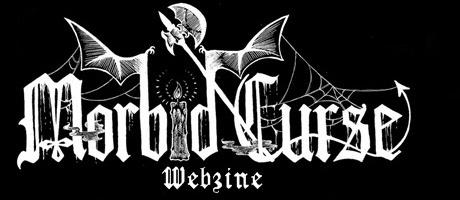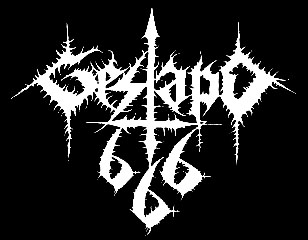
|

|
 Gestapo 666 is a French black metal band that was formed in 2000,
by Meyna'ch of Mütiilation and Noktu of Celestia. Their first demo was released that same year, and features three songs.
The music is fairly raw and primitive, but somehow fails to really live up to the expectations that one might have, considering
the people involved. Still, it is by no means a bad release and is worth listening to, particularly for those that appreciate
the old LLN recordings.
Musically, Gestapo of Satan sounds like something that came from the French scene of
the early-to-mid '90s. From the songwriting to the mediocre level of musicianship that is on display, this is reminiscent
of the early Mütiilation demos, to an extent. That said, none of the songs are anywhere near as memorable as tracks like “Under
Ardailles Night” or “Suffer the Gestalt”. The first song, especially, is repetitive and boring, at times.
Half the song is nothing more than Meyna'ch screaming the title, “Darkness and Satan”, countless times over a
pretty boring riff. It is actually a rather disappointing and worthless song and also goes to show that his vocals are far
below what they once were. “Gestapo of Satan” is much better, and probably the best track on here, with guitar
melodies that actually possess some sort of melancholic feeling. It is rather fast-paced and possesses the same kind of chaotic
feeling that was often present on recordings such as Satanist Styrken and Vampires of Black Imperial Blood.
“Church Rape Division” maintains the dismal atmosphere, but is not consistent in doing so. Only the first riff
carries the same kind of miserable feeling, followed by several disjointed ideas, but returning to end out the demo.
The
production is really awful, hearkening back to the heyday of the Black Legions. It is still, easily, listenable, but it is
often difficult to hear all that is going on. Sadly, the guitar melodies are very low and do not stand out all that well.
The drumming is a bit louder, as if closer to the microphone. The vocals stand out on top of the rest, which is sort of necessary
given that Meyna'ch is unable to do what he once could. This demo would have benefited from having the guitar higher in the
mix, just to place more focus on the riffs.
In the end, Gestapo 666 is not exactly the most impressive thing that
either musician has ever been involved with, though it certainly has its moments. It is clear that Meyna'ch's best days were
behind him, at this point, and that he and Noktu did not put a great deal of time into writing and arranging this material.
Gestapo of Satan is missing certain fundamental elements that one usually looks for; however it does possess is a level
of sincerity that many other releases lack. If you are into the type of raw black metal associated with the LLN, give this
a chance.
(7 Apr. 2012)
 Gestapo 666 got off to a rough start, recording a brief demo and then
remaining silent for several years. Noktu was quite busy with Celestia and Mortifera, while Meyhna'ch left the band (though
it is likely that he was never a dedicated member to begin with). It took until June 2005 for the band's first full-length,
Black Gestapo Metal, to finally see the light of day. What listeners can expect is a continuation of the style that
was utilized on the first demo, but with better production. In many ways, this is reminiscent of the first Vermeth record,
in that it comes off as a somewhat generic representation of the Black Legions, just with higher sound quality.
The
songwriting is not terribly creative, though that is hardly what one would be looking for with this band, anyway. It is accepted
that Gestapo 666 is merely keeping the LLN spirit alive, in one form or another, and this is its main charm. On its own, the
material that comprises Black Gestapo Metal is not all that impressive. However, to those that remember the dark
and grim times that spawned the likes of Black Imperial Blood (Travel), Feasts or March to the Black
Holocaust, this L.P. serves as a posthumous tribute to those that went before. Personally, I often wished to hear such
recordings with a slightly better sound, just for the fact that so many brilliant riffs were hiding amidst all the chaos.
Still, that was also part of the character of those bands and the music that they created. Gestapo 666 removes the hissing,
feedback and excessive distortion to give listeners a clearer impression of the French black metal sound.
The arrangements
vary, from track to track, but the LLN riffing is easily heard. Some songs possess more aggression, though an overwhelming
gloom hangs over the majority of the material. This is most evident on the track “Opening the Crypt of Death”,
which is one of the highlights of the album. It is certainly in the minority, being one of the only tracks to feature such
a slow pace, but the dark atmosphere that it creates is very memorable. This is mainly due to the prominence of the guitar
riffs. Black Gestapo Metal is a release that is very much driven by the guitars. Drumming exists only to keep time,
really, and even the vocals are buried under layers of damp soil. Of course, therein lies one of the negative aspects of the
album. The mighty Meyhna'ch was replaced by Werwolf, of Horna / Satanic Warmaster fame. It is not that he does a bad job so
much as he fails to put forth a great deal of effort, throughout the entire recording. He does just enough to get by, without
matching the maniacal sort of vocals that one would expect from this music and it really holds things back, quite a bit. The
album also suffers from the fact that several of the riffs sound like they were recycled from the aforementioned
bands. There is a strong lack of originality that plagues this album, resulting in a lack of any unique character.
It
is odd to think that this release is considered as having high quality production, compared to bands like Black Murder, Torgeist
and Vlad Tepes, yet it would still be thought of as rather lo-fi when compared to most contemporary records. Black Gestapo
Metal actually rests at a very enviable position, being just clear enough for everything to be heard fairly well and
to allow for the music to make the most impact, yet still raw and gritty enough to belong to the underground. As previously
mentioned, the guitar is the dominant aspect of this album, and rightfully so. The drums and vocals are buried in the mix,
to an extent. In the case of the vocals, it seems to be a little too much, though it may help conceal the mediocre performance.
Gestapo 666 is not an essential band but rather one that is primarily of interest to those into the old French scene.
Their first L.P. fails to measure up to most of those old demos and albums, but the spirit is there and it is still a solid
dose of black metal, if not a bit average. While there are some things that could be improved upon, it is worth hearing. Chances
are, though it is not likely to blow you away, it will grow on you with repeated listens.
(14 Apr. 2012)
 Released in May 2007, the second offering from France's Gestapo 666,
Nostalgiah, covers much the same ground as before. This is raw black metal that owes a lot to the mid-'90s LLN bands,
and one can say that this band serves almost as a tribute to glorify and preserve what those musicians accomplished, so long
ago. This time around, they succeeded in doing a much better job.
Musically, this record is similar to the Black
Gestapo Metal in that it utilizes a lot of the same type of maddening tremolo melodies and soul-tearing palm-muted riffs
that combine to send the listener directly into Hell. This time around, there is a little more variation, both between the
different tracks and within them as well. Nostalgiah is very riff-oriented, with a fair amount of memorable riffs to
be found. There are times when the band members' other bands can be heard filtering in, somewhat; “Scriptures of Our
Black Melancholy” sounds very reminiscent of Satanic Warmaster, while traces of Celestia and Mortifera can be heard
from time to time.
The production of Nostalgiah seems to be a little bit clearer and more dynamic than on the
previous record. That is not to say that it possesses a slick, modern feel, for it does not. This is still pretty raw and
not at all easy to digest for those unaccustomed to the sounds of underground black metal. The production succeeds in putting
the guitar at the forefront, even moreso than on Black Gestapo Metal. The drumming can still be heard, but it never
distracts. The vocals are a little louder than on the last record, but this suits the music quite well, and they never get
to the obnoxious level of some of the old LLN recordings. Even if they had, it would have fit in with the theme and not really
been a problem anyway.
Nostalgiah is somewhat of a diverse album, with some riffs that seem catchy and remain
in your skull for days, while others are so bleak and dismal that you find yourself carving into your flesh without realizing
it. Much like its predecessor, it does well to maintain the old Black Legions sound, without really adding anything to it.
In this case, that is a good thing. If you want to hear a slightly clearer and updated version of what Mütiilation, Vlad Tepes
and Belketre were doing a decade or so earlier, pick this up. Highlights include "Dethroned Tyrant Will Return", "Shadow Hate
Division" and "Bestial Rites of Sacrifice".
(12 July 2012)
|

|

|





